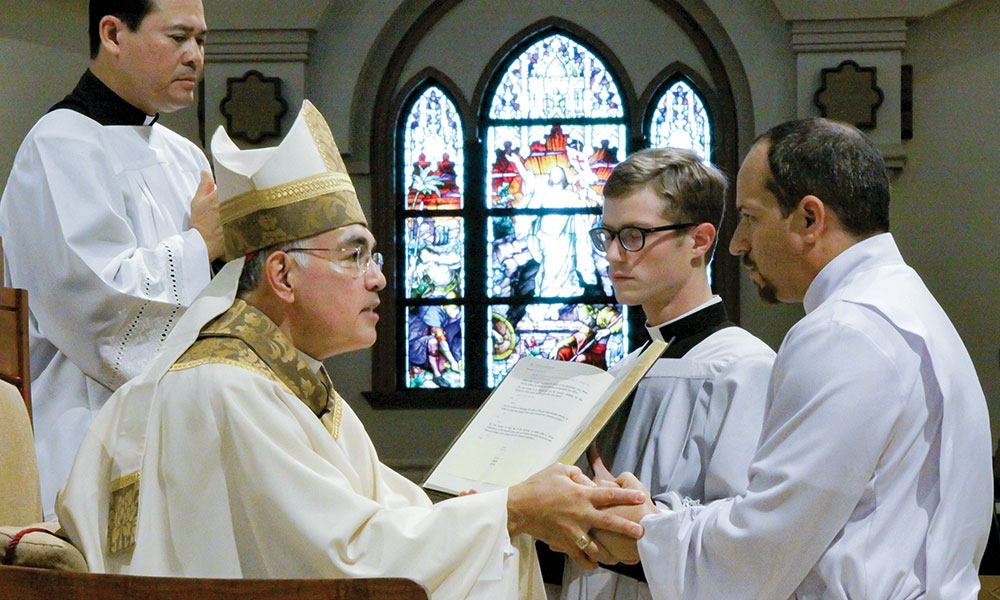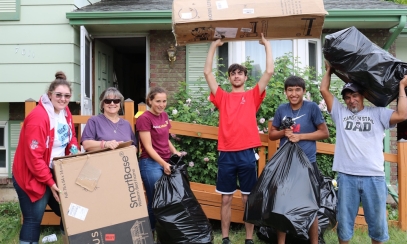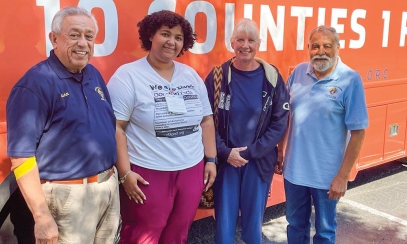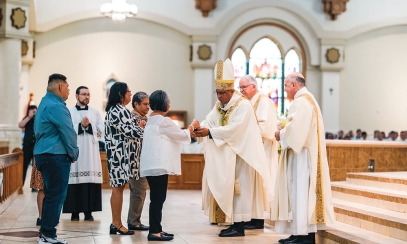
Diaconate: An ancient vocation seeking contemporary men
Forming men to be deacons is a challenging task, said Deacon Barry Ryan, who was recently appointed director of Diaconal Formation for the Diocese of Austin.
Forming men to be deacons is a challenging task, said Deacon Barry Ryan, who was recently appointed director of Diaconal Formation for the Diocese of Austin.
“Knowing that the bishop has entrusted me to form these men well is a daunting task and one that I’m finding out that I have to trust in the Lord truly. These are his men … they have been brought to our church to be formed.”
Bishop Joe Vásquez understands and knows the importance of proclaiming the Gospel and going forth to live the Gospel in one’s daily life, Deacon Ryan said.
2000 years ago
The role of the deacon is rooted in the early Christian community (Acts 6:1-6). The disciples appointed deacons to assist the apostles in practical matters, such as serving the community’s needs, distributing food to widows and supporting the apostolic ministry. Indeed, St. Stephen, one of the first deacons, became the first Christian martyr. Over time, the role of deacons expanded and contracted. At one point in history, the diaconate all but slipped away.
The Second Vatican Council, however, recognized the value of ordained deacons and restored the permanent diaconate. In Sacrum Diaconatus Ordinem, Pope Paul VI restored the permanent diaconate as a lifelong ministry within the church, allowing married men to become deacons, which the church had restricted for centuries.
Deacons in the diocese
The Diocese of Austin began its diaconate program in 1979 when Bishop Vincent Harris ordained Deacon John Peca at St. Ignatius Martyr Parish in Austin. Formation of the first class of deacons began in January 1981 with two programs offered at St. Monica Parish in Cameron: Romans 8, conducted by Father Charles Michalka, and Journey, by Father Tom Frank, who later was Deacon Ryan’s pastor when he was contemplating the diaconate. Father Frank was also a member of the original Diaconal Advisory Committee that served as a forum for communications between the Chancery and the diaconate and charted the diaconate’s future direction.
Bishop Vincent Harris ordained 25 deacons on July 14, 1984, at St. Louis Parish in Austin. Since then, the diocese has ordained 350 deacons.
Current deacons
Today the Diocese of Austin has 160 active deacons and 80 retired. About 20 deacons serve as parish administrators, and several deacons serve at the diocesan level as chancellor, director of Restorative Ministry, in Diaconal Formation and other areas. Deacons serve in various parish ministries, and many are involved in prison, hospital, hospice and other health care ministries.
Deacon Ron Walker, who was ordained in 2000 and has served as diocesan chancellor since 2006, said a deacon “is a man of prayer, loves the Word and Eucharist, loves to serve others, is willing to sacrifice his own goals if called to do so and lives a good and moral life with his family and community.”
Future deacons
A prospective deacon “is usually responding to or sensing a call to serve the church as an ordained minister and has received affirmation from others in the church, especially ordained clergy, that God may be calling him forth to serve in this way,” Deacon Walker said.
Before pursuing the diaconate, a man discerns the call with his wife, pastor and spiritual companions or directors, he said.
The next class of deacons (15 men) is currently in formation and will be ordained in 2025. One of Deacon Ryan’s primary responsibilities is to recruit men for the deacon class of 2028. He visits parishes to help pastors identify men in their parish who may already be contemplating answering God’s call to come forward and present themselves to the church and discern the diaconate.
Deacon Ryan believes there is a great need in the diaconate for men who have younger families. “We need to walk in faith with them, recognizing their spiritual gifts and talents, and that they are called to serve even at that young age to come forward and dedicate their life to God in service as a deacon,” he said.
Deacons remain a vital link between the church and the broader community, embodying the call to service and charity.
For more information on the diaconate, visit www.austindiocese.org/welcome or call (512) 949-2459.
Alfredo E. Cárdenas began as a freelance writer for the Catholic Spirit in 2000, writing histories of parishes. In 2010, he became editor of the South Texas Catholic, a publication of the Diocese of Corpus Christi. Upon his retirement in 2017, he returned to Austin, where he resumed writing for the Catholic Spirit.



